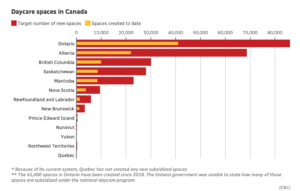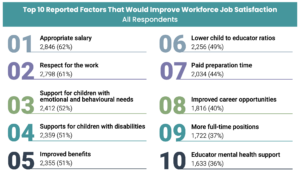$10 a day child care for all. Are we there yet?
There is extensive evidence to show that children who participate in high quality early learning and childcare programs are better prepared for school and for life – from kindergarten right up through graduation and on into their adult lives. Children develop foundational skills linked to thinking, language, and well-being that have been identified as the key to success in today’s rapidly changing world.

Canada’s multi-billion-dollar investment in childcare – Progress made so far
Early learning and high-quality childcare are crucial first steps not just for the child, the family, and the community, but for Canada as a whole as it navigates its way into the future. Three years ago, the federal government announced the multi-billion-dollar Canada-wide Early Learning and Child Care plan, with an aim to reduce child-care costs to an average of $10 per day for all Canadians by 2025.
Each province and territory, except Quebec (where $10 a day childcare already exists), agreed to put in place at least a 50 per cent (average) parent fee reduction by the end of 2022, with further commitments to lower fees to an average of $10 a day by 2025-26. Most provinces and territories are now in the process of implementing funding programs and initiatives to support the costs associated with expanding child care.
The overall goal of the federal program was to ensure that many more parents had access to child care, and child care centres wouldn’t rely as much on parent fees to cover all of their costs. The reality has not yet matched the goal. Staff shortage and an increased demand for spaces has exposed considerable gaps, both in the plan and potentially in the true cost to ensure success.
According to Statistics Canada, 62% of parents with children under five who are not currently in child care, report they are unable to find available care, an increase from 53% in 2019.
“The lack of daycare spaces and before and after spaces is absolutely a crisis in [this town]. Families are putting their children on waitlists the day their children are born and waitlists are over 2 years. Parents, even in November, are still calling the school office in tears as there are still no before and after-school care spaces available in any type of care situation.”
Elementary principal, Southwestern Ontario, People for Education 2023-24 Annual Ontario School Survey

Source: CBC News
 Source: Measuring Matters: Assessing Canada’s progress toward $10-a-day child care, Canadian Centre for Policy Alternatives, 2023
Source: Measuring Matters: Assessing Canada’s progress toward $10-a-day child care, Canadian Centre for Policy Alternatives, 2023
What’s happening in Ontario?
According to new data from People for Education’s 2023-24 Annual Ontario School Survey, while 81% of elementary schools offer childcare or before/after school programs, only 33% have childcare for children under 4-years-old. In the schools with childcare, 41% of principals agree or strongly agree that teachers and the on-site child care providers work together to build alignment between the school day and child care programming; however, 34% disagree or strongly disagree. The data represent responses from 1,030 of Ontario’s publicly funded schools, from all regions of the province.
In Ontario, recruitment and retention of registered early childhood educators (ECEs) – who are essential to the success of ELCC programs – has become a major issue. New graduates are not moving into licensed care right after graduation, and many trained ECEs are moving on to work in other sectors after as little as 5 years. Low salaries are one of the main issues driving the retention and recruitment problem.

Source: Knowing Our Numbers: A Provincial Study with a Local Lens on the Early Childhood Education Workforce in Ontario, 2024.
Ontario has unveiled a timeline for a revamped funding formula under the Canada-Wide Early Learning and Child Care (CWELCC) program, which the province says will begin to address concerns from child care operators about rising expenses such as staffing, rent, and supplies. The new funding model will use a cost-based approach. According to the province, further details coming soon.
To be effective, the new funding formula will have to take into account a range of challenges, including child care cost structures, staff shortages, worker retention, and how to support rapid growth.
Budget 2024’s ‘The Best Start for Every Child’ – A step closer to $10 a day child care
Earlier this year three announcements made by the Prime Minister seemed to have brought Canada closer to the goal of accessible $10 a day child care across the country. Among the details in the announcement:
- A new $1 billion federal childcare expansion loan program.
- $60 million in low-cost loans and grants for public and non-profit child care providers.
- An increase in federal funding to support an increased number of qualified early childhood educators.
Budget 2024 signals a recognition by the federal government that more needs to be done to accelerate the expansion of low-fee high-quality early learning and child care so that it is available to the thousands of families currently unable to access it.
It also signals a recognition that access to child care has an effect not just on children, but on society as a whole.
